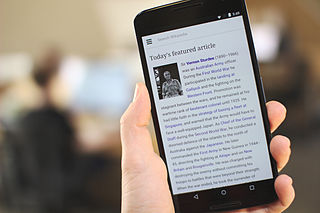Related Research Articles

BlackBerry was a maker of smartphones and other related mobile services and devices. The line was originally developed and maintained by the Canadian company BlackBerry Limited from 1999 to 2016, after which it was licensed to various companies.

A smartphone, often simply called a phone, is a mobile device that combines the functionality of a traditional mobile phone with advanced computing capabilities. It typically has a touchscreen interface, allowing users to access a wide range of applications and services, such as web browsing, email, and social media, as well as multimedia playback and streaming. Smartphones have built-in cameras, GPS navigation, and support for various communication methods, including voice calls, text messaging, and internet-based messaging apps.
Mobile device management (MDM) is the administration of mobile devices, such as smartphones, tablet computers, and laptops. MDM is usually implemented with the use of a third-party product that has management features for particular vendors of mobile devices. Though closely related to Enterprise Mobility Management and Unified Endpoint Management, MDM differs slightly from both: unlike MDM, EMM includes mobile information management, BYOD, mobile application management and mobile content management, whereas UEM provides device management for endpoints like desktops, printers, IoT devices, and wearables as well.
Android is a mobile operating system based on a modified version of the Linux kernel and other open-source software, designed primarily for touchscreen-based mobile devices such as smartphones and tablets. It is the world's most widely used operating system due to it being used on most smartphones and tablets outside of iPhones and iPads, which use Apple's iOS and iPadOS, respectively. As of October 2024, Android accounts for 45% of the global operating system market, followed by Windows with 26%.
Enterprise mobility management (EMM) is the set of people, processes and technology focused on managing mobile devices, wireless networks, and other mobile computing services in a business context. As more workers have bought smartphone and tablet computing devices and have sought support for using these devices in the workplace, EMM has become increasingly significant.

Bump was an iOS and Android mobile app that enabled smartphone users to transfer contact information, photos and files between devices. In 2011, it was #8 on Apple's list of all-time most popular free iPhone apps, and by February 2013 it had been downloaded 125 million times. Its developer, Bump Technologies, shut down the service and discontinued the app on January 31, 2014, after being acquired by Google for Google Photos and Android Camera.
Mobile Business Intelligence is defined as “Mobile BI is a system comprising both technical and organizational elements that present historical and/or real-time information to its users for analysis on mobile devices such as smartphones and tablets, to enable effective decision-making and management support, for the overall purpose of increasing firm performance.”. Business intelligence (BI) refers to computer-based techniques used in spotting, digging-out, and analyzing business data, such as sales revenue by products and/or departments or associated costs and incomes.
JVL Ventures, LLC d/b/a Softcard, was a joint venture between AT&T, T-Mobile and Verizon which produced a mobile payments platform known as Softcard, which used near-field communication (NFC) technology to allow users to pay for items at stores and restaurants with credit and debit card credentials stored on their smartphones. The partnership was first announced on November 16, 2010; following a trial period in 2012, the service officially launched nationwide on November 14, 2013. The official Softcard app was available for NFC-compatible smartphones using the Android operating system and later on Windows Phone 8.1.

Recon Instruments was a Canadian technology company that produced smartglasses and wearable displays marketed by the company as "heads-up displays" for sports. Recon's products delivered live activity metrics, GPS maps, and notifications directly to the user's eye. Recon's first heads-up display offering was released commercially in October 2010, roughly a year and a half before Google introduced Google Glass.

Apperian, Inc. was a Boston-based software company. The organization provided a mobile application management platform that did not require app code modifications or software development kits (SDKs).
Mobile application management (MAM) describes the software and services responsible for provisioning and controlling access to internally developed and commercially available mobile apps used in business settings, on both company-provided and 'bring your own' mobile operating systems as used on smartphones and tablet computers.
A mobile application or app is a computer program or software application designed to run on a mobile device such as a phone, tablet, or watch. Mobile applications often stand in contrast to desktop applications which are designed to run on desktop computers, and web applications which run in mobile web browsers rather than directly on the mobile device.

Magisto is a technology company founded in 2009 to provide artificial intelligence (AI) technology for video editing. It produces an online video editor of the same name for automated video editing and production aimed at consumers and businesses. The company was acquired by Vimeo in 2019 for an estimated US$200 million.
Bring your own device refers to being allowed to use one's personally owned device, rather than being required to use an officially provided device.
Skyfire is a software company founded in 2007, and acquired by Opera Software ASA, now Otello Corporation, in 2013. In 2015, the company became the Network Solutions division of Opera, and ceased using the Skyfire brand name. They offer network optimization technologies including video optimization and monetization tools for carriers. Skyfire discontinued its Skyfire Web Browser in 2014 in order to consolidate its focus on its mobile operator technology. Skyfire was funded by venture capital, and was acquired by Opera Software ASA in March 2013.

Appcelerator is a privately held mobile technology company based in San Jose, California. Its main products are Titanium, an open-source software development kit for cross-platform mobile development, and the Appcelerator Platform.
Linux for mobile devices, sometimes referred to as mobile Linux, is the usage of Linux-based operating systems on portable devices, whose primary or only Human interface device (HID) is a touchscreen. It mainly comprises smartphones and tablet computers, but also some mobile phones, personal digital assistants (PDAs) portable media players that come with a touchscreen separately.

Good Technology, owned by BlackBerry Limited, is a mobile security provider headquartered in Sunnyvale, California, United States. The company serves more than 5,000 organizations worldwide in industries such as financial services, healthcare, manufacturing, energy and utilities, legal, government, and technology. Good makes products for managing and securing mobile devices in a business environment. The company focuses on securing apps and data on mobile devices.
Acompli is a discontinued mobile app that allowed for user interaction with email messages as well as management of multiple email accounts in one programme. In addition, the tool also organized one's calendar and shared files. This application provided for integration with cloud storage platforms such as Dropbox, OneDrive, and iCloud; it also carried support for Microsoft Exchange and Gmail. Acompli launched on 24 April 2014. The startup company, which had $7.3 million in funding, was led by CEO Javier Soltero, J.J. Zhuang (CTO) and Kevin Henrikson.

IBM MaaS360 is a SaaS Unified Endpoint Management (UEM) solution offered by IBM that manages and protects any existing endpoint including laptops, desktops, mobile devices and apps, wearables, IoT and purpose built devices and allow protected, low risk access to company resources. IBM Security MaaS360 with Watson integrates with current security platforms owned by different companies. It’s AI powered analytics removes friction by reducing actions required from the device user.
References
- ↑ Simonite, Tom. "One Smart Phone, Two Personalities". "MIT Technology Review." October 13, 2011
- ↑ Eadicicco, Lisa. "Meet Enterproid: An NYC Startup That Tackled BYOD With A Mobile App That Divides". International Business Times. October 20, 2012.
- ↑ Rao, Leena. "Enterproid Separates Professional and Personal Lives on Android Phones" . TechCrunch. February 28, 2011.
- ↑ Chowdhry, Amit. "Google Acquires Enterprise-Friendly Device Manager Divide". Forbes . Retrieved 2 June 2016.
- ↑ "As BlackBerry fizzles, Enterproid scores $12M for its BYOD solution, rebrands as 'Divide'" . Retrieved 2 June 2016.
- ↑ Ludwig, Sean. "Enterproid grabs $11M to separate business and personal on Android" . "VentureBeat." October 6, 2011.
- ↑ Kim, Ryan. "Enterproid Brings Work/Life Balance to Smartphones" . "GigaOM." Feb 28, 2011.